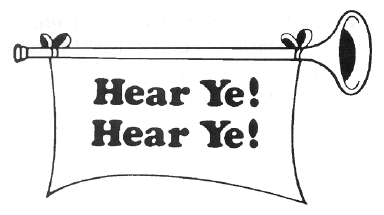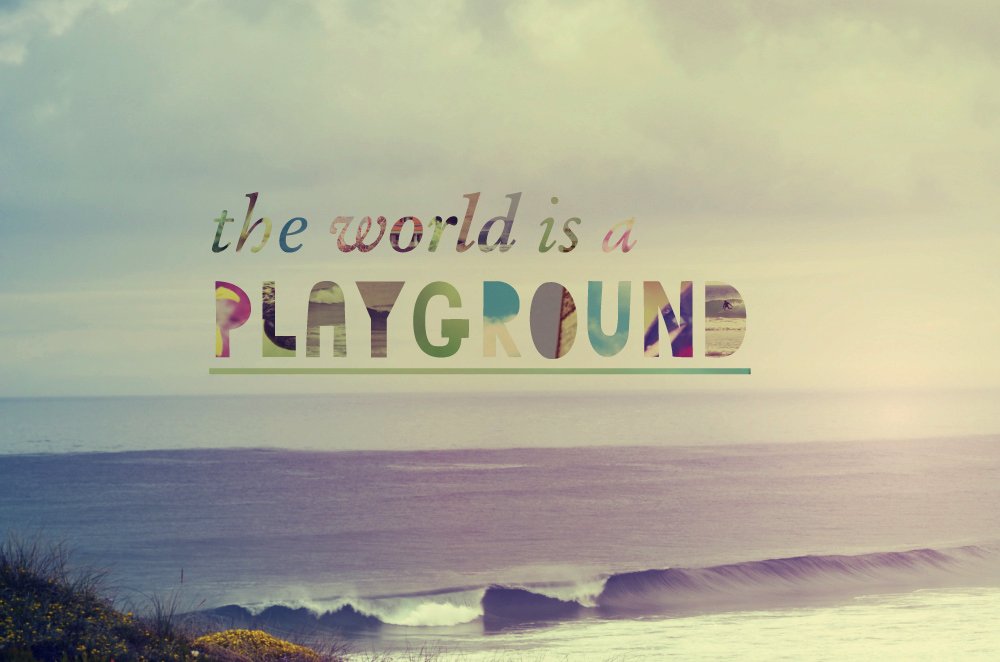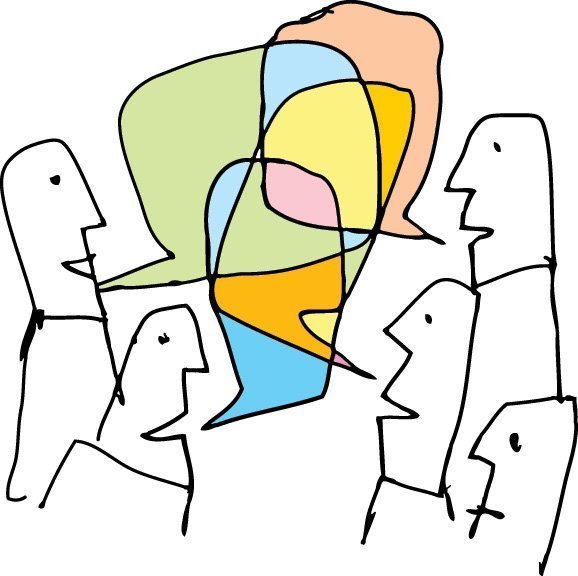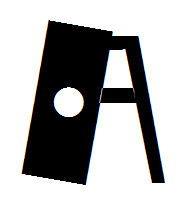The world is our personal playground. How do we make it our own? Do we just slide into success, or do we have to climb the ladder to get there?
We climb the ladder to success, but we realize that we are still successful even when we slide down. There are more obstacles ahead of us to plow through.
Group work, like I said in my last post, can be an amazing learning experience! The work we did in English 332 was very interesting and different. We did a few different activities. We created our own fairytale spinoff story, created a rap, played video games, and made creative objects like robot fingers. How in the world could all of these things be in the same class and relate to the same type of learning?
We are learning about literacy. There are many different forms of literacy in this world. As society is concerned, literacy seems to only be about reading and writing and stuffing your nose in a book.
Literacy is much, much more than that! We use literacy every day. Literacy was shown through each of the group presentations in different ways. We can combine the fairytale spinoff and rap into the same type of category.
For these presentations (fairytale and rap), we were using written/spoken literacy. These were incredibly beneficial to the class because, rather than conforming to societal standards of literacy, they pushed the boundaries and showed that literacy is ever expanding and can be applied to our daily lives in the modern world.
Fairytales are old and outdated, yet we still consider them classics. What happened when we did a spinoff of either Cinderella or Little Red Riding Hood? Well my group, for one, did a spinoff of Little Red. This is what our group came up with.
- Little Red off to Grandma’s and finds a lost wolf pup
- Takes it to Grandma, she warns Red of the dangers and responsibility of raising wild animals
- Raises wolf to be a hunting dog
- Years later go on hunting trip and they encounter feral wolf and in self defense kill it
- Wolf pup realizes the dead wolf was it’s mom
- Wolf pup attempts Red’s murder but Grandma swoops in and saves the day at the last second
As you can tell, it is miles away from the original story, but it still has some of the same intrinsic issues and characters. One other group had an interesting spinoff of Cinderella where she, was now a he. There were a lot of new and inventive ideas. It really pushed for creativity with all the groups.
There was also a group who showed us how rap can be for learning purposes. Each group came up with a few lines about literacy that had to do with their group’s topic. It was inventive, creative, and a genuinely fun activity! Listening to people try and rap was definitely an extra treat for the day.
There were two other groups, the gamers and the builders.
The builder group had multiple stations. There was a group building these PVC flyers that would spin when you pulled the string, the balloon racing group, the cell phone vibrating mechanism group, the kaleidoscope group, and last, but certainly not least, the robot fingers group.
I was a part of the group making robot fingers. We had to figure out, through looking at the instructions and having a little verbal instruction, how to make the straws bend correctly with the string and attempt robot fingers. It was a very exciting adventure for our group, and for myself! This is to give you a visual of the robot fingers.

Last was our group, the gamers. We let everyone play a variety of board games, computer games, and one group even created their own game. We had them figure out various principles from games. For us, the learning principles presented by James Paul Gee proved to be incredibly helpful and relevant.
- Clue: Probing Principle–>Learning is a cycle of probing the world (doing something); reflecting in and on this action and, on this basis, forming a hypothesis; reprobing the world to test this hypothesis; and then accepting or rethinking the hypothesis
- Life: Meaning/knowledge is distributed across the learner, objects, tools, symbols, technologies, and the environment
We found all of these to be useful and helpful. Our favorite to watch was the group creating their own game. They were inventive and excited to learn.
Every group was fun, exciting, and helpful for understanding various literacy practices!

 I posted this in an earlier blog. It was a quick reflection on something that we had read in class previously. Do I still think this to be true? I think it holds a lot of truth, but I think that we are free to shape ourselves in more than one environment. Yeah, every environment that we are in could be considered “our environment.” Why shouldn’t it? Well, people like to think of our environment as strictly home and school when we are growing up. That’s just not true. Within each of those environments there are smaller environments that we can identify as things that mold us. Not just school, but classrooms, friend groups, lunch lines, things we hear in other people’s conversations, etc. Not just home, but all the things we do at home, the people we see, the trips we go on, etc. Also, sometimes these little environments mesh with the other big environments. Sometimes school will go home and then we have homework. Occasionally this can be difficult, but we don’t have to let it stress us out. Let our environments do their thing and we can live in a stress free world.
I posted this in an earlier blog. It was a quick reflection on something that we had read in class previously. Do I still think this to be true? I think it holds a lot of truth, but I think that we are free to shape ourselves in more than one environment. Yeah, every environment that we are in could be considered “our environment.” Why shouldn’t it? Well, people like to think of our environment as strictly home and school when we are growing up. That’s just not true. Within each of those environments there are smaller environments that we can identify as things that mold us. Not just school, but classrooms, friend groups, lunch lines, things we hear in other people’s conversations, etc. Not just home, but all the things we do at home, the people we see, the trips we go on, etc. Also, sometimes these little environments mesh with the other big environments. Sometimes school will go home and then we have homework. Occasionally this can be difficult, but we don’t have to let it stress us out. Let our environments do their thing and we can live in a stress free world.


 It might not seem that important in college, but these people could be your lifelong friends! Even if they don’t become something near and dear to your heart, people would usually rather work with people who bothered to at least learn the tiniest (yet incredibly important) detail about them. You’ll have a better work environment for all of you and people might be a little more enthusiastic about giving their input.
It might not seem that important in college, but these people could be your lifelong friends! Even if they don’t become something near and dear to your heart, people would usually rather work with people who bothered to at least learn the tiniest (yet incredibly important) detail about them. You’ll have a better work environment for all of you and people might be a little more enthusiastic about giving their input. What person doesn’t respond well to snacks? Of course people have allergies and things, but people love free food! Be mindful of health concerns. For example, you might not want to choose something that has to do with peanuts because there are quite a few people with peanut allergies and those get pretty serious. Have a cereal party! You can’t go wrong with a couple bowls of delicious cereal. Or you can opt for some fruit and vegetables
What person doesn’t respond well to snacks? Of course people have allergies and things, but people love free food! Be mindful of health concerns. For example, you might not want to choose something that has to do with peanuts because there are quite a few people with peanut allergies and those get pretty serious. Have a cereal party! You can’t go wrong with a couple bowls of delicious cereal. Or you can opt for some fruit and vegetables Who said group work had to be boring? You already learned people’s names (or at least tried) and you brought snacks, that sounds like the start of a fun time! When you have a long period of time where you’re working in a group, you need to take breaks every now and then. Use those breaks to have a good time! You should try and laugh and enjoy yourself, because chances are that everyone else is kind of uncomfortable and bored as well. Take away those negative feelings with laughter and games. If you really don’t know what to do, go on youtube and watch some funny cat videos. Guaranteed to make anyone smile.
Who said group work had to be boring? You already learned people’s names (or at least tried) and you brought snacks, that sounds like the start of a fun time! When you have a long period of time where you’re working in a group, you need to take breaks every now and then. Use those breaks to have a good time! You should try and laugh and enjoy yourself, because chances are that everyone else is kind of uncomfortable and bored as well. Take away those negative feelings with laughter and games. If you really don’t know what to do, go on youtube and watch some funny cat videos. Guaranteed to make anyone smile.

 Website:
Website: